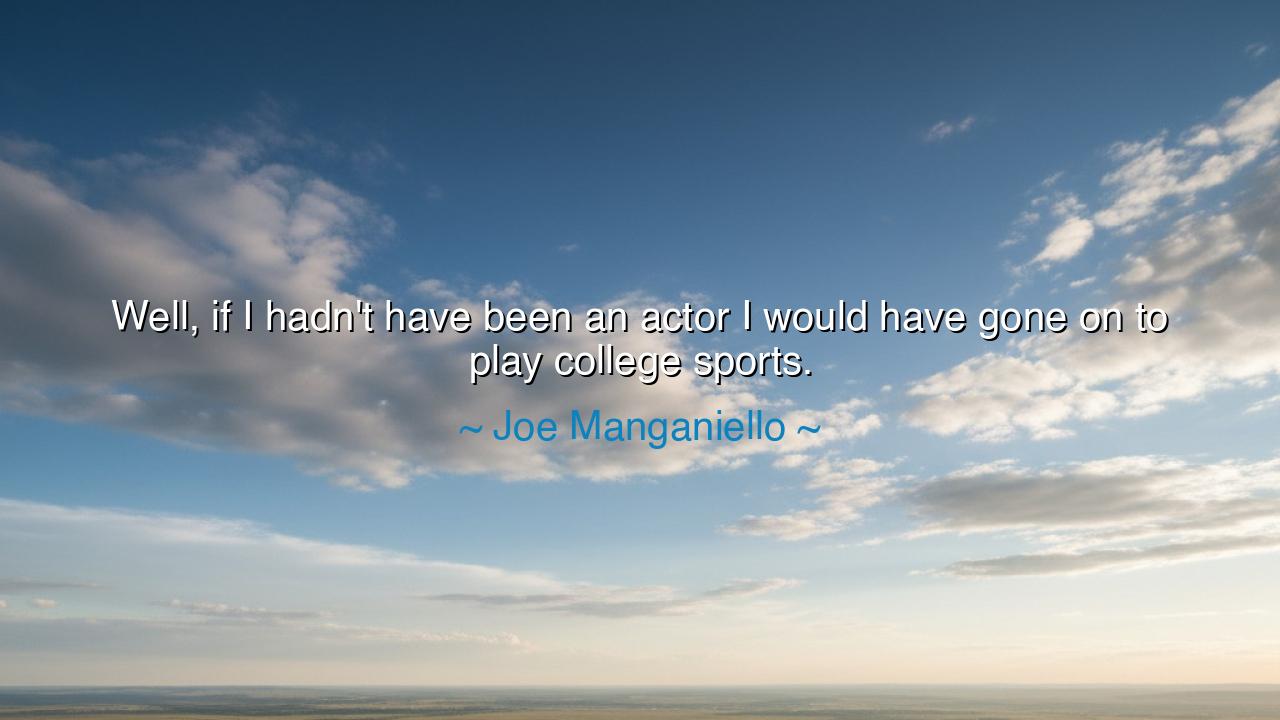
Well, if I hadn't have been an actor I would have gone on to






"Well, if I hadn’t have been an actor I would have gone on to play college sports." Thus spoke Joe Manganiello, a man of might and presence, whose life has balanced upon the crossroads of art and strength. In these words we hear not only a reflection on personal destiny, but also a truth that touches all humankind: that each soul carries within it more than one path, and that the shape of a life is often determined by which calling is pursued. His words speak to the tension between dreams and discipline, art and athletics, imagination and muscle, and the recognition that greatness might have been found in either road.
The mention of college sports is not a casual aside. It speaks to the years of dedication, training, and fierce will that mark the athlete’s journey. To step upon that field requires not only physical might, but discipline of character—the dawn practices, the sweat poured out unseen, the sacrifice of comfort for mastery. In the same way, the actor’s craft is not mere pretense, but labor of soul and discipline of body, requiring the same rigor in a different arena. Thus Manganiello’s words remind us that both fields—stage and sport—demand sacrifice, courage, and resilience. They are twin altars upon which men burn their energy to shine before the world.
History gives us many who faced such crossroads. Consider Cicero, who might have lived as a philosopher in quiet study, yet instead stepped onto the stage of Roman politics, where his voice became the weapon of a republic. Or think of Bo Jackson, who in our own age mastered both baseball and football, embodying two destinies at once. Their lives reveal that talent often blooms in many directions, and choice determines which blossoms endure. So too with Manganiello: the body of the athlete, the voice of the actor—both were within him, but fate decreed one path to be trodden.
The deeper wisdom in his statement is the humility it conveys. For Manganiello does not say, “I was destined only for acting,” but rather admits that another path might have fulfilled him. This is a rebuke to the myth that each life has only one true calling. Instead, his words affirm that human potential is vast, that one may be shaped for more than a single destiny, and that what matters most is the devotion brought to the chosen path.
Yet his choice also speaks of courage—the courage to step away from the familiar safety of sport, where strength and victory are measured in points and trophies, into the uncertain, subjective realm of art, where success is measured in the hearts of strangers. To abandon one calling for another is itself an act of heroism, for it requires not only talent, but the willingness to risk failure, ridicule, and obscurity. In this, Manganiello teaches us that life is not about clinging to the expected, but daring to walk the uncertain path that ignites the spirit.
The lesson for us is plain: honor the many talents within you, but choose one with courage, and devote yourself to it with the discipline of both athlete and artist. Do not lament the road not taken, but walk fully upon the road you choose. Remember that potential is not wasted when redirected; it is transformed. The strength Manganiello might have carried onto the field became the power of presence he carries onto the stage. In the same way, whatever we leave behind may yet feed what we pursue.
Practical action is simple: look within and see the many seeds of possibility. Choose with wisdom, and once chosen, pour yourself into that field as though it were the only one. But never despise the paths you did not take; they are not failures, but roots feeding the tree of who you are. Whether you are an athlete, an actor, a worker, or a dreamer, bring to your craft the same energy, devotion, and courage that Manganiello brought to his. For in the end, it is not which path you choose that matters most, but how fiercely and how faithfully you walk it.
Thus the quote endures, not as idle musing, but as a torch passed down: a reminder that man is capable of many lives, but must live the one he chooses with the fullness of his strength. The athlete and the actor, the body and the soul, the field and the stage—each is a proving ground, and each, if entered with devotion, may lead to greatness.






AAdministratorAdministrator
Welcome, honored guests. Please leave a comment, we will respond soon